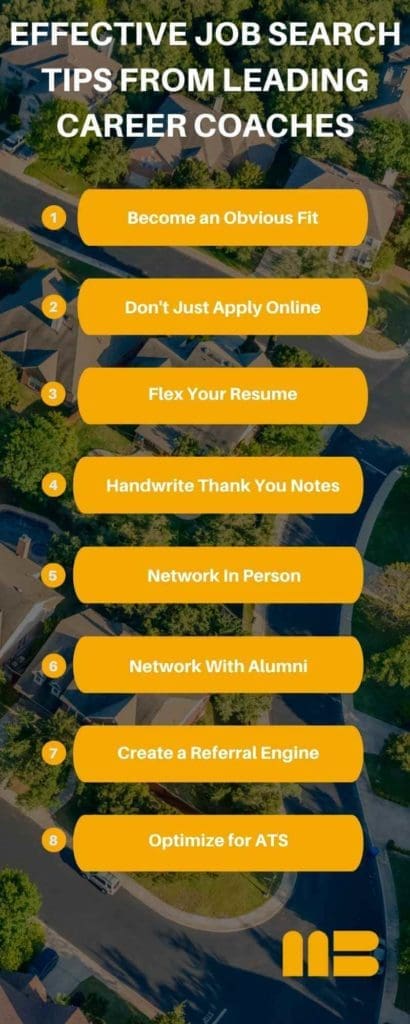Learning new and effective job search tips can be what’s needed to take your job hunt to a new level – and get hired! Many people spend hours upon hours searching and applying for new jobs on job boards and career sites and never hear back at all – not even an acknowledgment email. They button up their online presence, knock out a great
For this article, MatchBuilt welcomes Marla Holdread, a career strategist, leadership coach, and the founder of Shift Career & Leadership Coaching, to round up great outside-the-box tips for job seekers. Maria not only shares her own thoughts and ideas to get your dream job but also those of other leading career consultants, coaches, and hiring managers. The shortlist of sound, time-saving job search tips that will help you fine-tune your strategy during the hiring process include making yourself an obvious fit, not limiting yourself to online applications, and remembering the handwritten thank you.
Let’s boil things down to a short list of effective job-searching tips to help you fine-tune your strategy and reduce unnecessary time and frustration.
14 Effective Job Search Tips From Leading Experts
1. Make Yourself an Obvious Fit
Maria suggests making yourself an undeniable candidate and to leverage the job description.
When you apply for a job opening via an online application process, your
resume will likely be screened by an applicant tracking system and then (assuming you make this first cut) the hiring manager. The first human eyeballs that review yourresume are often those of a lower-level HR person or recruiter, who may or may not understand the nuances of the job you’re applying for.Study the job description and any available information you have on the position. Are you mirroring the words and phrases in the job description? Are you showcasing your strengths in the areas that seem to be of paramount importance to this role? Tailor your
resume to fit the position and job description you are applying for.
Pro Tip: Mirror words in the job description during job interviews and on your
2. Don’t Limit Yourself to Online Applications
Maria adds the importance of aligning yourself with people already in the company you are applying to.
Do you want your job hunting to last and last? Well, then, continue to rely solely on submitting online applications. Would you prefer to accelerate your confidential job search? Then, don’t stop once you apply online for that position.
Find and connect to people who work at that company of interest and schedule informational interviews with would-be peers. Approach an internal recruiter and ask a few questions and get on the radar of the very people who might influence you to get an in-person or phone interview.
By lining up with people on the inside of the companies at which you want to work, you will instantly set yourself apart. Decision-makers interview career-conscious people who come recommended or by a personal referral before they start sorting through the blob of resumes that arrives by way of the ATS.
Pro Tip: Get to know people at the target company.
3. Remember, Your Resume Is Not a Tattoo
Maria adds that you need to modify wording and switch bullets to continuously address the different jobs you apply to.
If your
resume and LinkedIn profile don’t position you as a direct match for the role you are applying for, don’t be afraid to modify wording, switch around key terms in the skill set and work experience sections, and swap bullet points in and out. Yourresume , including an entry-level resume, is not a tattoo or your LinkedIn profile. Treat them as living, breathing documents throughout your job search.If you’re a covert job seeker, remember to turn off your activity broadcasts (within privacy and settings) when you edit your LinkedIn profile. If your current boss or colleagues are connected to you on LinkedIn, they may get suspicious about all the frequent changes.
Pro Tip: Turn off activity broadcasts if you want to stay discrete.
4. Engage With Hiring Managers
Matt Parkin, a LinkedIn Personal Branding Coach at MWM Consulting, encourages you to use outbound sales strategies to get noticed.
Treat your job search like a sales cycle. You are the product you’re trying to sell, and the recruiters and hiring managers are your customers. Instead of simply applying to jobs online, use outbound sales strategies to get noticed by key decision-makers.
This can include connecting on LinkedIn, liking/commenting on their posts, and sending an audio/video message to them via LinkedIn messaging. I recently posted a job on LinkedIn, and not a single applicant liked/commented on my other posts; only one candidate took the time to email me about their interest in the role. No applicants sent me audio/video messages.
Pro Tip: Job seekers who treat their job search like a sales cycle will stand out from the crowd.
5. Thank You Matters
Maria reminds us of the importance of genuine thank-you notes.
A thoughtful thank-you note will often seal the deal in today’s texting and instant messaging world. If you are competing against other candidates of your caliber, delivering a thank-you note sends the message that you are willing to go the extra mile for the position.
Consider crafting original, genuine thank-you notes (one for each interviewer) when you return to a computer following the interview. The speed with which you send the letters, and the quality, will make an impact. And finally, remember that the interviewer cares much more about what you can do for them than what you want from the deal. Indeed, they’ll care much about what you want once you establish your worth. But during the interview, you must demonstrate why you make business sense to hire, period.
Pro Tip: Craft a memorable, hand-written thank you note with an anecdote from your meeting.
6. Attend In-Person Networking Events
Jonathan Zacharias, the Founder of GR0, a focused, dedicated, and committed digital marketing agency, reminds us how relevant in-person networking events still are.
With the pandemic under better control, attending in-person networking events and job fairs can be a great way to find new opportunities.
I believe speaking with hiring managers or HR representatives face-to-face will increase your odds of landing a job, as opposed to mass emailing your
resume on the internet. I foresee more in-person events happing this year and beyond, giving ample opportunities to find positions.
Pro Tip: Make a good impression when you meet colleagues at a networking event.
7. Know Your Career Objectives
Michael Hess, the eCommerce Strategy Lead at Code Signing Store, emphasizes the importance of a clear career objective.
As a career expert, this is one of the most original job-searching tips. Before even beginning to look for a new job or career, it is prudent to set goals for yourself. Identifying the type of career you wish to pursue will provide you with a clear objective and narrow down your job search.
Employers may perceive you as indecisive if you lack a career objective, which could result in you being placed in a position that is not the best fit for you. Therefore, it is essential to have a career plan in place. You could set numerous career goals for yourself, including your desired salary, job satisfaction, job title, and the responsibilities you wish to assume within your role.
These three factors are generally interconnected, but knowing which is most important to you can be helpful when seeking a career change and searching for a new position.
Pro Tip: Be clear regarding your career objectives and goals when interviewing.
8. Network At Your School
Athena Kan, the CEO of Dreambound, a company focused on helping people obtain trade licenses and matching them with employers, reminds us how powerful an alumni group can be.
If you have a certificate or license in something, ask the school that gave you your certificate if they know of any employers who are actively hiring. This applies to trade certificates such as a Certified Nursing Assistant certificate/Commercial Driver’s License (i.e., truck driving), Bachelor’s degree, and even a Salesforce training certificate.
First, schools are constantly evaluated on their job placement rates. Even if they are not legally required to report job placement rates, they tout it out to future students – so it’s essential to them. Almost all schools have someone (if not a whole department) explicitly focused on job placement for graduates.
Second and most important, if an employer is looking to hire someone with a specific credential, the first place they’ll go to is a local school. At Dreambound, we see every nursing home and hospital trying to get in touch with healthcare training programs.
As a result, these schools have job placement rates close to 100%, and most students have jobs before graduation. And this benefit doesn’t end after you graduate and get your first job. Schools are happy to help you find employment even years after completing your education.
Greven Carl Manuel, a Content Writer at FashMatch, adds:
Tap Into Your Alumni Network – Many universities, colleges, and other organizations have alumni networks that can help connect you with employers.
Reach out to these groups for job leads or even mentorships–you never know who might be looking for new talent in the future.
Pro Tip: Get involved with your alumni association and create an enriching network with key colleagues.
9. Take Advantage of Internship Opportunities
Maria adds how important internships can be to begin a rewarding career.
Internships are a great way to get your feet wet in a new field and simultaneously build your
resume and network. An internship may provide a stepping stone to a permanent position. If this is the case, you should strive for excellence in everything you do.If you want a permanent job, you need to show that you’re the best fit for the position. You can show your value by asking insightful questions or volunteering to take on additional responsibilities as your comfort level at work increases.
Pro Tip: If you are a recent graduate or new in your career, starting out as an intern may be a great first step in landing a specific role.
10. Follow Up On Everything
Mark Anthony Dyson, a career counselor and speaker with The Voice of Job Seekers, reminds us to acknowledge every correspondence politely.
Following every call, interaction, interview, introduction, job application response, or interesting insight, follow up by adding value and showing gratitude. People forget about a job seeker they just met because they’re busy and distracted. A second call or note as a follow-up makes a big difference.
Employers and recruiters are overwhelmed by the positions they’re filling. People you meet and connect with over coffee are busy with life and other obligations. If you’re single-minded in your focus, your job search, and the people you connect with, are your priorities.
Pro Tip: Make it a point to follow up with each touch-point during the networking process.
11. Create a Referral Engine
Mark Anthony Dyson adds the importance of creating your own referral engine.
Informational interviews are the best way to get the quality information you need while growing a connection. Conduct interviews with people working jobs you want about their career path, and receiving feedback and constructive direction about yours is powerful.
The feedback often leads to connecting with other industry professionals and job leads or helps you decide on a better career direction. These conversations will likely ignite your job search efforts better than meeting a dozen people at a networking event.
Pro Tip: Ignite your job search by reaching out to those in the jobs or at the companies you’re pursuing.
12. Optimize for an Applicant Tracking System
It’s important to submit a
resume that passes the ATS test. When writing an ATS resume, it’s important to only apply to roles you are qualified for, make it easy to skim-read, format it appropriately, utilize white space, and leverage the job description for keywords. Be sure to include your contact information and your resume summary and clearly highlight your skills, education, and experience.
Pro Tip: Optimize your
13. Ask For Referrals
Andrew Fennell, a former recruiter and Director at StandOut CV, a resume and careers advice service, reminds us of the importance of asking for referrals.
Our number one suggestion would be to find someone who works for the company you want to work at and ask them for a referral. Most companies offer a referral bonus to employees who successfully bring new employees in. This means putting you forward will be in the employee’s interest.
You could begin by looking at the company’s LinkedIn page and clicking on the People tab to see who works there. Ideally, you’ll find someone within your field who might be a part of the team you want to work at.
A positive rapport might be created a following and engage with the employee’s content before sending a connection invite. This could lead to a brief chat, where you explain your experience and confirm that you’re looking for a referral.
Pro Tip: Find someone who works for the company you want to work at and ask them for a referral.
14. 30 Minutes of Outreach & 30 Minutes of Conversation Each Week
Wendy Toth, a longtime journalist and founder of PowerSuiting, a career coaching and resume-writing business designed for creative women, advocates for appropriately allocating your job searching time.
As a career transition coach, I work with my clients on building up a network of advocates rather than direct job-seeking. This means regularly dedicating time in your schedule to catch up with former colleagues or learn something from people in your network who interest you. It does not have to be much time either.
Generally, this means finding one hour a week and splitting it in half: 30 minutes to do outreach and scheduling and 30 minutes for the actual zoom chat or phone call.
Forming deeper relationships in this way leads to information on upcoming job roles sooner and with more relevancy than blindly searching. It also forces you to consider whether a change is a good idea before going through a formal interview process. Most importantly, tending to your relationships leads to a more satisfying life, no matter what.
Pro Tip: Allocate time for outreach and time to actively talk to those in your network.
Job Search Tips Infographic
Essential Job Search Strategies Summary
At Matchbuilt, we pride ourselves on supporting and providing helpful resources for our clients and candidates during the interview process.
For more information on nailing your next interview, check out the latest job search tips regarding evidence-based recruiting practices, the most common interview questions, how to prepare for a virtual interview, how to build a great resume, and how to leave your current job without burning bridges.






